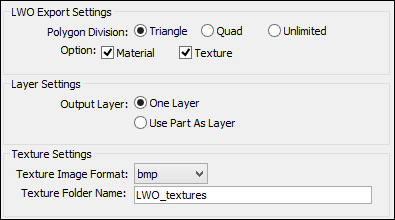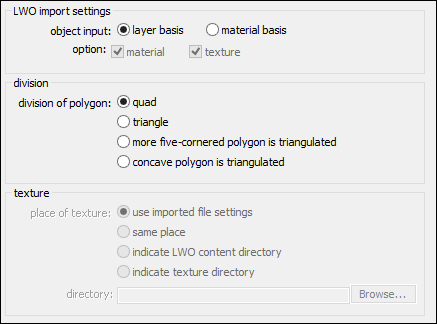LWO Import and Export
The LWO Converter converts between LightWave 3D object files (to be referred to as LWO files) and Shade3D object data files.
With the LWO Converter, direct exchange of object data with LightWave 3D is possible without first converting the object data into another file format.
LWO Export Settings

Select File > Export > LightWave Object... to open the LWO Export Settings.
Choose from No Subdivision / Coarse / Regular / Fine / Very Fine in the Surface Subdivision pop-up menu, specify if you want to allow more than four vertices per face, and click OK.
- Polygon Division
- Specify the type of division.
Triangle, Quad, Unlimited - Material
- When this check box is on, the Material information will be exported.
- Texture
- When selected, texture information will be exported.
- Output Layer
- Specifies the export layer
One Layer, Use Part As Layer - Texture Image Format
- Select the texture image format from bmp / jpg / png / tiff / targa / hdr.
- Texture Folder Name
- Select the folder that contains the texture images to use.
LWO Import Settings

- object input radio buttons
- Specify a way of division from Layer basis / material basis
- Material
- When selected, material information will be imported.
- Texture
- When selected, texture information will be imported.
- Division of Polygon
- Specify a way of division when export as a polygon mesh form quad / triangle / more five-corrnerd polygon is triangulated / concave polygon is triangulated.
- Place of Texture
- Specify the place to export texture from use imported file settings / same place / indicate LWO content director / indicate texture directory.
When materian basis radio button is on, This radio buttons will be enabled. - Directory
- Choose the directory of contents using the Browse... for use texture.
LWO Import/Export Specifications
Exporting Shapes
| Shade3D Objects | LightWave3D | Remarks |
|---|---|---|
| Closed line | Objects are exported as a single mesh object. | If the closed line does not lie in a single plane, the object will be divided into triangles. The Hole setting for closed lines is not supported. |
| Open line | ||
| Revolved line object | The Closed checkbox and the Revolve Begin and End text boxes for revolved lines are supported. | |
| Extruded line object | ||
| Disk | ||
| Revolved disk | The Closed checkbox and the Revolve Begin and End text boxes for revolved disks are supported. | |
| Extruded disk | The Closed checkbox and the Extrude Begin and End text boxes for revolved disks are supported. | |
| Sphere | ||
| Polygon mesh | Rounded edges of polygon meshes are supported. | |
| MetaMesh | ||
| Boolean modeling | ||
| Link object |
Exporting Surface Attributes
| Surface Attributes in Shade3D | Materials in LightWave3D |
|---|---|
| Diffuse Color | Color |
| Value of Specular 1,2 | Specularity |
| Size of Specular 1,2 | Glossiness |
| Reflection | Reflection |
| Glow Color and Value | Luminosity |
| Transparency | Transparency |
| Mapping | Image mapping |
| Channel | Diffuse, Specular 1,2, Reflection, Transparency, Bump |
| Layer | MultiLayer (Image) |
| Mapping | Without Box |
| Other | Flip Vertical, Flip Horizontal, Inversion axis, Invert color |
Note All other parameters, textures, and mappings are not supported.
Exporting Surface Attributes
Exporting a Shade3D file as an LWO file will specify surface settings for each polygon which is converted based on the Shade3D object (such as curved surface, closed line object, re- volved object, extruded object, sphere, and disk).
In this case, two surfaces are created for each object in Shade3D. (However, only one surface is created for spheres and curved surfaces.) In LightWave 3D, each surface is as- signed a surface number (SN0001, SN0002, and so on). The original part names and object names assigned in the surface attributes of Shade3D are ignored.
Master Surface settings in Shade3D are applied as surface set- tings for each converted polygon.
Importing Surface attributes
Importing LWO files into Shade3D will display the file names and surface names from LightWave 3D as object names in the Browser. Surface attributes are imported with each of the corresponding parameters described in the table shown earlier.
Exporting Light Objects
LWO Export does not support lights. Light settings in Shade3D are ignored when exported.
Exporting Joints
| Converted Shade3D Joints |
|---|
| Rotator joint |
| Slider joint |
| Scale joint |
| Uni-Scale joint |
| Ball joint |
Note Other joints are not supported.
All joints are treated as parts, and although surface attributes applied to joints are also converted, motion settings have no effect.
As the Skin settings are also supported, models posed by adjusting joint values in Shade3D can be exported as they are.